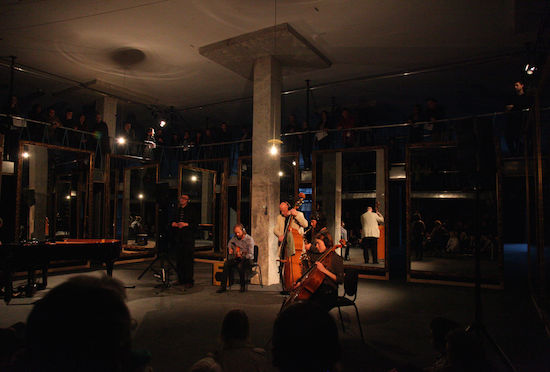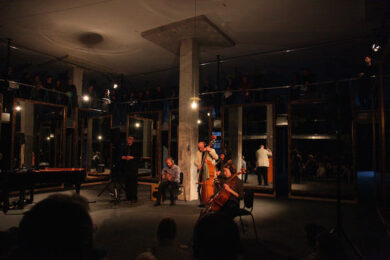It’s unfortunate that the opening night of the second annual London Contemporary Music Festival is to be somewhat overshadowed by the ructions over Consumer Electronics’ set that concludes it. Unfortunate not only because the flap itself exposes the challenges that face the LCMF’s project of suggesting a series of new genealogies for the future of experimental music, but also because much of what precedes it is excellent.
Christopher Hobbs’ ‘McCrimmon Will Never Return’ (1970–73), performed on four reed organs by the composer himself alongside Gavin Bryars, John Tilbury, and Philip Thomas, proves what only seems obvious in retrospect: that minimalism and the drones of traditional Scottish music are a natural fit. The music thrums with an extraordinary richness as the traditional Highlands bagpipe melody is subtly recomposed through a series of machine-like processes.
This notion of musical "machines" was developed by composer John White in the late sixties, after the experience of finding meaningful ways to interpret Cornelius Cardew’s majestic graphic score, Treatise. Much of the music within this first third of the evening comprises the work of former friends and associates of Cardew’s from the Scratch Orchestra and affiliated groupings, including White’s own ‘Piano Sonata No. 46’, which is performed with enormous sensitivity by Tilbury.
The highlight of these is probably Gavin Bryars’ 1, 2, 1-2-3-4, a piece whose titular count-in triggers not so much the start of play as the pressing play on each individual performers’ cassette walkman. Eyes closed and be-headphoned, each play oblivious to the others but along with music to which the audience remain unaware (I discovered later that, as in the original recording for Brian Eno’s Obscure Records, they were all listening to the music of Johnnie Ray). The result resembles something like a vast iceberg made of Henry Mancini, gradually melting, breaking up, and drifting apart. It’s a mesmerising, if disquieting experience.
As with many a reunion, the political arguments that have divided the British experimentalists of the seventies are largely set aside tonight. With the exception, that is, of two solo vocal performances by Maggie Nicols. Formerly of both the Spontaneous Music Ensemble and Keith Tippetts’ prog behemoth Centipede, improvisation remains a determinedly political act for Nicols. "The state," she avers, in the midst of a mesmerising flow of glossolalia, tourettes-like tics, and a whole babel of different accents and assumed voices, "cannot improvise. They only know how to give orders." By turns virtuosic and vitriolic, Nicols’ performance is a testament to the supple deterritorialising powers of the voice.
Of this 70s generation, only Nicols stays to watch Consumer Electronics take the stage with a scree of white noise that feels like thousands of tiny shards of glass penetrating one’s eardrums. A roadworks-esque beat drops in and the thoroughly suited and booted Philip Best begins yelling angrily into a pair of heavily-overdriven dynamic mics. Quickly the wind seems to be taken from their sails and it becomes clear that the real action is going on over at the sound desk, where the group’s own engineer is engaging in an almighty shouting match of his own with the in-house sound guy, over acceptable degrees of punishment he might be allowed to inflict upon the PA system.
After about twenty minutes, the plug on the whole thing is pulled with the arrival of a baying mob of angry neighbors and a van full of police, upset – apparently – as much by Best’s persistent barked expletives as by the actual noise levels. There’s a small commotion with this abrupt end to the proceedings, and Russell Haswell – who joins Consumer Electronics for the night on various modular devices – is particularly affronted. "Smash the place up!" he urges a bemused and reluctant audience.
If politics were largely kept off the menu on the first night, it is the dish of the day on the second, garnished with piano pieces by radical Italian composer Luigi Nono, and Cornelius Cardew’s lilting harmonisation of ‘The Red Flag’. The meat comes courtesy of Johannes Kreidler, who "moderates" his own Fremdarbeit (2009), a piece which sees the German composer "outsourcing" his music-making to a series of ill-paid Asian assistants.
As the writer Adam Harper suggests in a Q&A earlier in the evening, Kreidler adopts "the mantle of the hyper-capitalist in order to exacerbate its contradictions", so we may take the condescending attitude he affects towards his subcontractors as part of the act. Interestingly, however, Xia Non Xiang, the Chinese composer-for-hire who paid $30 dollars to plagiarise Kriedler’s style in fulfilment of the European’s composition commission, arguably does a better job of Kreidler’s sample-heavy post-Darmstadt pointilism than Kreidler does himself. What better illustration of Hegel’s dialectical notion, that the slave knows the master better than the master knows himself?
It might be presumed conceited to pair the brutalist noise sound of Tokyo-based artist Pain Jerk with extracts from the Noh theatrical tradition dating back to the 13th century under the banner of a "Japanese Extremism" (singular). But the combination ultimately proves inspired, with more in common that you might expect.
Few other performances could match these two for intensity. Furthermore, each display a power to carve up space, whether through the refined gestures of principal Noh singers Udaka Norishige and Udaka Tatsushige or through the strange psychoacoustics of high frequencies as employed by Pain Jerk (performing with Russell Haswell). Both have their beats, each as furious and deftly syncopated, but in neither case do they become the be all and end all. Time is not regulated by metronome or conductor, but collectively negotiated and mapped out by expressive bursts. Powerful statements of their own respective traditions, both performances remain unique, unpredictable events that prove those traditions still speak eloquently today.
Saturday sees the premiere performance of a major new work that harks back to a significant old work. In the early 60s, Peter Zinovieff was probably the first person to have a computer in his spare room – and almost certainly the first person to use such a domestic machine to produce music. Back then, asking a computer to generate random numbers was nigh on impossible, so Zinovieff acquired a Geiger counter and pointed it at his luminous watch, using the resulting sequence of readings as a means of generating control voltages for his first computer-aided composition.
That delirious sequence of pitches makes its return in the second movement of Our Too, a concerto for violin and computer, performed and co-composed by Aisha Orazbayeva. This second collaboration, between the British composer and founder of EMS Synthesizers and the young Kazakh violinist, sees the pair extending and developing the language of their collaboration into ever richer territory.
Amongst the more obviously digital sounds, much of the texture of Our Too is made of a myriad sounds pre-recorded from the violin, deftly sequenced into a dense skein of insectile flutterings, stridulating, and murmuration. Such is the range of the violinist’s virtuosity, capable of producing so vast an array an sounds from a seemingly limitless palette of extended techniques, that as an audience we are wont to look from human to machine and back again and find it close to impossible to say which was which.
It is tempting to attribute Michelangelo Pistoletto’s ‘Ten Less One’, the performance which brought this week long festival to a close, to an act of insurgency. As the Italian artist’s collaborator Lorenzo Fiaschi brought his sledgehammer to bear on nine of the ten elaborately gilt-edged mirrors that had framed and multiplied the performance space throughout the week, we might speak of the destruction of bourgeois values or the death of postmodern reflexivity. But we could just as well see the piece as symbolic for the shift effected from Scarlatti to Sciarrino, highlighted in the programme which precedes it.
Placing the intimate, impressionistic keyboard sonatas of the Neapolitan classicist alongside recent works for piano and string quartet by his modern successor, Sciarrino lays bare their hidden continuities. Like Pistoletto, Sciarrino breaks apart Scarlatti’s smooth surfaces into isolated fragments of glistening light and colour, hurtling through space. On ‘Escerzi Di Tre Stili, Sciarrino’s transcription for strings of Scarlatti’s keyboard pieces, melody lines become passages between sharp intensities, bursting with life. But perhaps the true star of the evening was pianist Mark Knoop who had been present in one performance or other throughout the week. Tonight he took centre stage and the brilliance of his interpretations gleamed in the limelight.
The evening had an unexpected coda, however, after Lorenzo Fiaschi took his bow from violently exposing the coloured surfaces lying behind the glass of nine mirrors. "Ten," he announced with a prim smirk, "less one." But that wasn’t enough for one audience member. Russell Haswell rose unannounced from his seat at the edge of the stage and brought the mallet down upon the final pane. Here finally was our act of insurgency, from the man who a week earlier had proposed to smash the place up.
And nothing could have been a more fitting end to a festival that has been like a week-long insurgency against an often staid and complacent contemporary music establishment. New histories have been written here and enacted live, and new futures have been promised and envisioned. Nowhere else could one find the inspiring performance poetry of John Giorno programmed beside the experimental operatics of George Aperghis, the atmospheric glitch jazz of Supersilent beside the febrile paleo-black midi of Conlon Nancarrow, the neon vaporwave of Fatima Al Qadiri besides Leon Michener’s lysergic vamps on Wagner’s Ring, and for it all to fit together, knotted tight by a series of provocative conceptual gambits that make the LCMF the diametrical opposite of the supermarket-like laissez-faire of so many modern festivals. Frankly, the whole festival has been little short of miraculous and I, for one, cannot wait for next year’s.
<div class="fb-comments" data-href="http://thequietus.com/articles/15474-live-report-london-contemporary-music-festival” data-width="550">



